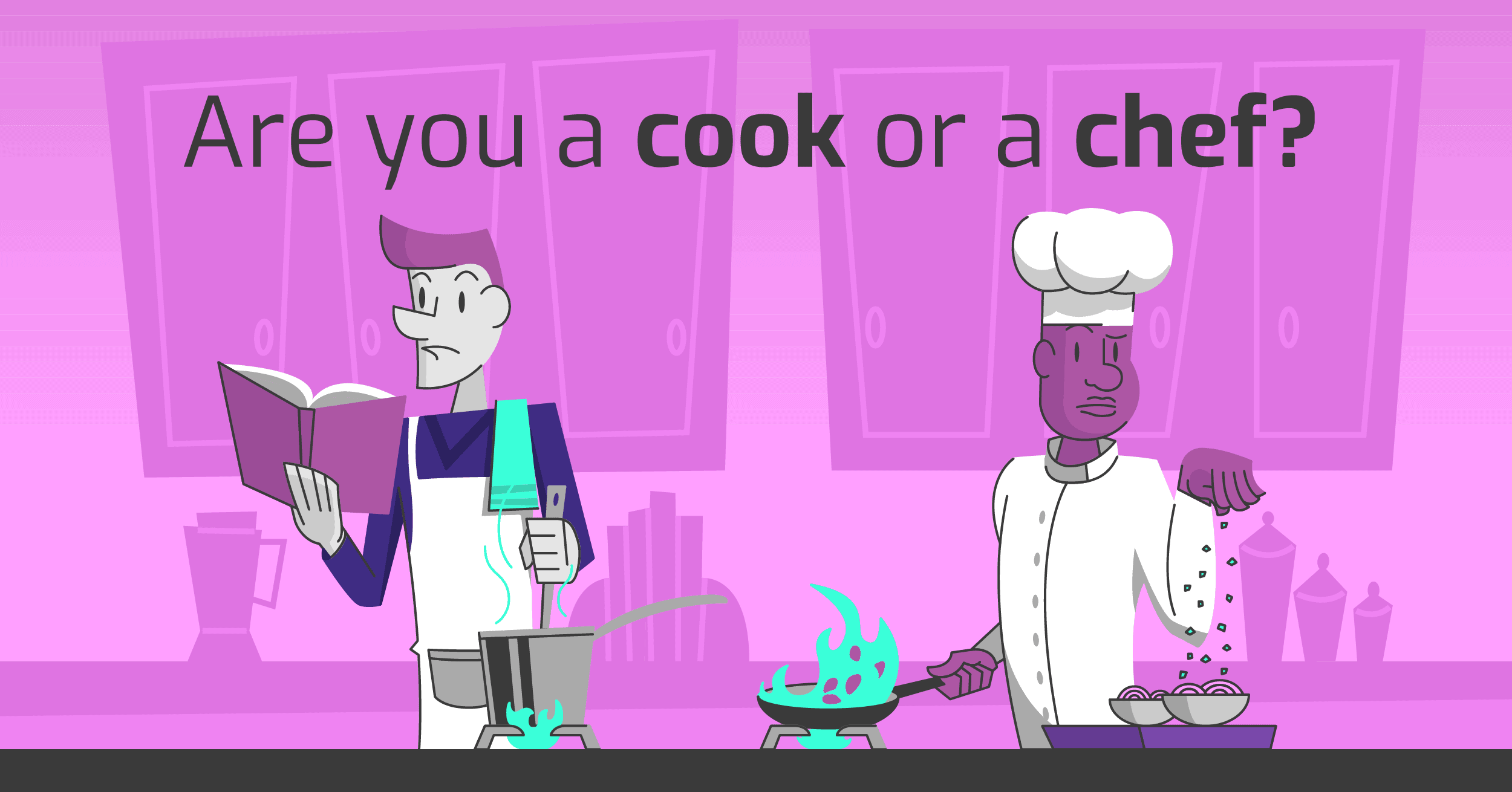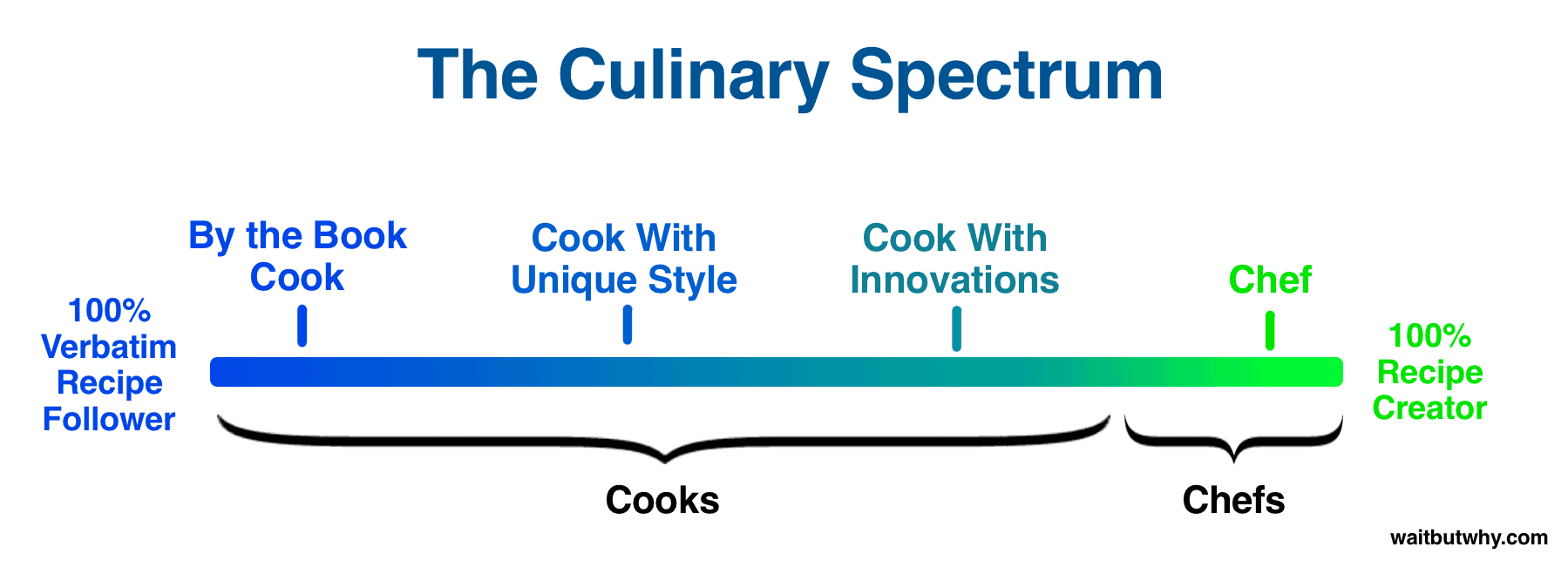Are you a cook or a chef?

Today, Kurt will be introducing you to one of our favorite offbeat thinkers, Tim Urban of Wait But Why. He introduced me to it a few years ago and I find myself returning to the lessons again and again.
When do you need to be a cook, and when do you need to be a chef? Read more below.
First, the latest:
- B2B sales and marketing departments everywhere are trying to adopt to a world without in-person visits, tradeshows, and conferences. Seeing an opportunity, Cameo – the app that lets you pay celebrities to drop a video note to your friends or family – is partnering up with Sendoso to deliver celebrity messages on the B2B networking app. We’re considering whether or not to have snoop dogg wish ya’ll a happy holiday for your client gifts this year. If you have the subscription, WSJ’s coverage of the story is great.
- In our business, there are two schools of thought, two opposing philosophies around which many a heated debate has raged: brand vs direct response. A new term has arrived to describe the various ways of doing both: precision branding. Read this article from AMA to learn about the art of communicating brand on a personal level.
Hello, Kurt here.
I’m going to give away another secret in the “look smart” department by introducing you to a blogger who’s been a guiding light for us at SRH.
Wait But Why bucks all conventions of internet content. The blog posts are long, sometimes taking hours to read. The thinking is sprawling and somewhat erratic. The visuals are done in microsoft paint.
The name of the blog is also the mission of the blog – incessantly asking why about everything. Tearing things down to their most essential elements and reconstructing them in a new light. Tim’s unique way of thinking – called “First Principles Reasoning” – is surprisingly simple and devastatingly effective.
If you didn’t bother clicking that link, I’ll explain it very simply, using the classic SpaceX example that Elon Musk (a devote first-principles man) gives.
The conventional wisdom is that building rockets is too expensive for private enterprise. NASA’s the only game in town because of how complex and expensive it is. Elon asked a simple question – what is a rocket? Aerospace-grad aluminum alloys, plus some titanium, copper, and carbon fiber. When he looked at the price of these things on the commodity market, he realized he could make a rocket for 2% of the price NASA builds them for.
Now of course, it was a little more complicated than that, but because he was able to reason by principles, not analogy, he got the ball rolling at SpaceX, which is now responsible for more US space flights than NASA.
The best article Tim has about First Principles Reasoning is called “The Cook and the Chef.” Bookmark it for a weekend read.
He puts thinking on a spectrum from “cook” to “chef”:

The cook follows recipes – reasoning by analogy.
The chef invents recipes – reasoning by first principles. Using raw ingredients and remixing them in a new way.
When you approach a problem like a chef, you get a creative solution that most people wouldn’t even dream about. This is when that word “genius” comes out, and why creativity is highly valued in our society driven by innovation.
This doesn’t mean being a cook is bad. For most things in your life, you will be a cook. It’s not possible to be a Chef in all aspects of life. When it comes to real cooking, for example, I am very much not a chef. I enjoy following recipes and getting the result. I won’t blow anyone away at dinner parties, but that’s not my goal in life.
If you enjoyed this little lesson, I strongly recommend a few of Tim’s blog posts, all of which use first principles reasoning to think through common problems.
- Why Procrastinators Procrastinate
- Taming the Mammoth, or Why You Should Stop Caring What Other People Think
- How to Pick Your Life Partner
- Your Life in Weeks (Fair warning, this one is a total mind blower that can be a little intense for some folks)
Next time you have an important challenge in your life, try to look at it through a first-principles lens. You’ll be surprised at what you come up with.

